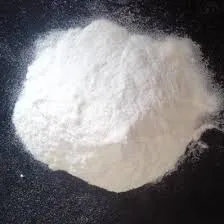
Oct . 05, 2024 14:52 Back to list
china hpmc-hydroxypropyl methyl cellulose
Hydroxypropyl Methyl Cellulose An Overview
Hydroxypropyl Methyl Cellulose (HPMC) is a versatile and widely used cellulose ether that is synthesized through the modification of cellulose, a natural polymer derived from plant cell walls. HPMC is characterized by its ability to form gels, retain moisture, and function as a thickening agent, making it an essential ingredient in numerous applications across various industries.
Chemical Structure and Properties
HPMC is produced by the etherification of cellulose with propylene oxide and methyl chloride. This modification leads to the introduction of hydroxypropyl and methoxy groups, which enhance the solubility of cellulose in water. The degree of substitution (DS) of these groups significantly influences HPMC's physical and chemical properties, including its viscosity, solubility, and thermal stability. Generally, HPMC is soluble in cold water, forming a clear or slightly cloudy solution, while remaining insoluble in most organic solvents.
One of the remarkable properties of HPMC is its ability to act as a binding agent, thickener, and film former. Its viscosity can be tailored to meet specific needs by adjusting the concentration and degree of substitution. These properties make HPMC a valuable component in products ranging from pharmaceuticals to construction materials.
Applications of HPMC
1. Pharmaceutical Industry In the realm of pharmaceuticals, HPMC serves multiple purposes. It is commonly used as a thickening agent in ointments and gels, where it enhances the product's texture and stability. Additionally, HPMC acts as a binder in tablet formulations, improving the mechanical strength of the tablets. It also serves as a controlled-release agent, allowing for the gradual release of active pharmaceutical ingredients (APIs) in the body.
china hpmc-hydroxypropyl methyl cellulose

2. Food Industry HPMC is utilized in the food sector as a food additive, where it functions as a thickener and stabilizer. It is also used in gluten-free products to improve the texture and mouthfeel, compensating for the absence of gluten. Its ability to retain moisture helps in extending the shelf life of baked goods and other perishable items.
3. Construction In construction, HPMC is employed as a thickening agent in cement and tile adhesives. It enhances the workability of the mortar and improves adhesion, ensuring a durable bond between surfaces. Furthermore, its water-retaining properties contribute to better curing of cement, which is crucial for achieving desired strength and durability.
4. Cosmetics and Personal Care HPMC is also a key ingredient in many cosmetic and personal care formulations. It acts as a thickener, emulsifier, and film-forming agent in products like lotions, creams, and gels. By helping to stabilize emulsions, HPMC ensures product homogeneity and enhances the sensory attributes of cosmetic formulations.
Environmental Impact and Safety
HPMC is generally regarded as safe (GRAS) for use in food and pharmaceutical applications. Its biodegradability makes it an environmentally friendly choice compared to synthetic polymers. Manufacturers are increasingly mindful of sustainability, leading to the development of eco-friendly production methods for HPMC.
Conclusion
Hydroxypropyl Methyl Cellulose (HPMC) is a multifunctional material with a wide range of applications in various industries. Its unique properties, including water solubility, thickening capabilities, and binding functions, make it an invaluable ingredient in pharmaceuticals, food production, construction, and cosmetics. As industries continue to seek sustainable solutions, the demand for HPMC is likely to grow, further cementing its role as a crucial material in modern applications.
-
Versatile Hpmc Uses in Different Industries
NewsJun.19,2025
-
Redispersible Powder's Role in Enhancing Durability of Construction Products
NewsJun.19,2025
-
Hydroxyethyl Cellulose Applications Driving Green Industrial Processes
NewsJun.19,2025
-
Exploring Different Redispersible Polymer Powder
NewsJun.19,2025
-
Choosing the Right Mortar Bonding Agent
NewsJun.19,2025
-
Applications and Significance of China Hpmc in Modern Industries
NewsJun.19,2025







